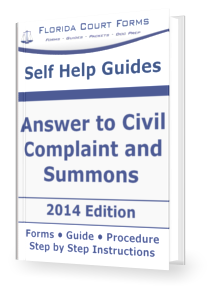Florida Civil Law
Information on Civil Law in Florida
Florida Civil Law: Court cases that are considered as civil law include disputes or disagreements between a plaintiff and a defendant.
Florida Civil Law: Court cases that are considered as civil law include disputes or disagreements between a plaintiff and a defendant.
A plaintiff is the one who files a complaint, and the defendant is the one who responds to the complaint.
Civil laws in Florida distinguish themselves from the criminal laws, which are directly involved in crimes like death and homicides.
The parties in civil law cases can be individuals or corporations, and Florida law allows for change venues from one jurisdiction to another or one county to another.
The Florida Senate on its website allows the public to access detailed procedures in civil laws all the way back from year 1997 to the current.
Civil Law in Florida
In order to be a party in a civil law case in Florida, a person must be eighteen years of age of or older, must not have any legal or mental disability, must live in the state of Florida as a permanent resident, submit a series of documents for criminal records and other relevant documents, and take an oath.
Depending on the type of case and the parties involved, a Florida civil law case may be held in federal, circuit, or county courts.
Now, if a Florida civil law case falls under the jurisdiction of the federal courts, then it will be first held in either United States District Court for Northern District, Middle District, or Southern District.
The Northern District includes twenty-three counties such as Dixie, Franklin, and Wakulla County. The Middle District consists of thirty-five counties like Columbia, Hamilton, Nassau, and Suwannee County.
Lastly, the Southern District covers nine counties like Palm Beach and Highlands County.
U.S. Courts website allows the residents to find out which of the three district they fall under.
Along with Georgia and Alabama, Florida falls under the U.S. circuit Court of Appeals for the Eleventh Circuit.
The Florida State Courts
According to the annual report from the Florida State Courts, the approximated funding for 2009-2010 was $66,536,360,098, and $451,311,113 were expected for the state court systems.
The report also listed the number of Florida civil law cases in the state courts by each of the twenty circuits.
This document is easily accessed by anyone through the website of Florida State Courts, and compares the figures from the previous year as well.
Common Legal Terminology
How to Conduct Yourself in Court
What is a Subpoena
What if You Lose Your Case
Starting a Small Claims Case
How to Give Convincing Testimony
Florida Homestead Law
Florida Homestead property is one of the most misunderstood parts of Florida civil law. The article gives the basics of Florida Homestead property.
Florida's Homestead protections are actually three distinct protections under Florida civil law, each with a different purpose and effect: asset protection, reduced property taxes, and protection of surviving spouses and minor children. Each is explained below.
The Florida Constitution exempts homestead property from levy and execution by most creditors. So long as the property qualifies as homestead, the amount that can be protected is not limited, which makes the Florida Homestead an excellent asset protection vehicle.
Under Florida civil law, the homestead protection cannot help a homeowner with stopping foreclosure if they default on a mortgage taken out against their primary residence. Even if the purchase of the homestead was designed to defeat creditors, the protection still applies.
Under the Bankruptcy Reform Act of 2005, however, debtors in bankruptcy may lose all or a portion of the homestead protection.
In bankruptcy, homestead protection is capped at $125,000, unless the debtor occupied the Florida homestead property and previous Florida homestead properties for 1215 days prior to the bankruptcy filing.
Also, transfers into Florida Homestead within 10 years intended to defraud creditors may be challenged by the bankruptcy trustee.
Federal creditors, such as the Internal Revenue Service, mortgage holders, and persons holding mechanics liens on Florida homestead property are not restricted by the Florida homestead provisions.
Under Florida's Save Our Homes Act, the assessed value of a Florida Homestead is restricted to an increase of no more than 3% per year.
If a Florida resident passes away owning a Florida Homestead in his or her own name, if the resident had minor children, the minor children are entitled to the entire property, or, if the resident was married, to no less than a remainder interest in the property. A surviving spouse is entitled to no less than a life estate in Florida Homestead property.
The homestead provisions can be a trap for the unwary, especially for those with estate plans drafted while a resident of another state. For example, a person owning a house in New York and a condominium in Florida may have decided, while a New York resident, to leave the house to his spouse and his condominium to a daughter from a first marriage.
If the person retires to Florida as a resident and then passes away, his spouse will inherit the house under the terms of the will and then be given a life estate in the Florida condominium.
Also See These Florida Civil Law Pages...
Self Help Guides
Answer to Civil Complaint and Summons
The help you need to create an answer & file in time.

Our Self Help Guide Answer to Civil Complaint & Summons is
suitable for anyone who has been served with a Civil Complaint &
Summons and needs to fill out and file an answer before time runs out.
Includes interactive forms, sample forms with instructions, common
affirmative defenses, glossary of legal terms found in civil lawsuits,
and more.
Legal Documents Preparation Services
Your legal documents ready to file at a price you can afford!
Legal Documents Preparation Services
Your legal documents ready to file at a price you can afford!

Our Petition Preparer Service can have all your documents professionally prepared after a brief interview with our experienced Legal Document Specialists.
Your court papers will be in your hands and ready to file in as little as three days! We guarantee our work. Just ask us for a quote.
|
